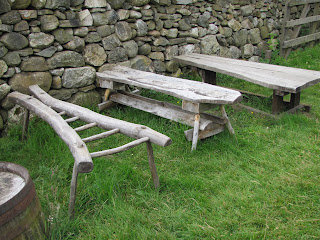 |
A Highland Shepherd by Sir Edwin Henry Landseer1802-1873
|
Sheep Stell
Keeping sheep safe and in good condition in winter would have been very difficult for John McLeod. In a typical Caithness storm shepherds would herd the flocks to circular sheep stells that had been built for shelter. As well as shelter inside the stell for a small number of sheep apparently they were also used in quite a different way. In snowstorms sheep were kept outside the stells. They huddled in a mass on the downwind side. Those on the outside of the huddle continually eased themselves in along the wall on each side. Being on the outside of a curved wall there were no corners into which the sheep could be pressed, and, being circular, the stell performed its function in any wind direction. The shepherds then would need to check the flock from time to time as long as the storm persisted.
 |
Sheep Stell at Rumsdale by David Glass
|
Diseases
Arsenic
Foot-rot resulted from sheep grazing on soft grassy land
like that at Rumsdale, particularly about the end of summer when the dews
became heavy. Sheep with foot-rot, an infected sore between the hoofs, go lame.
Their hoofs were trimmed and dressed with carbolic acid. Or mobs of sheep were
driven through troughs containing a solution of arsenic dissolved with potash
to harden the hoof. The use of arsenic to treat all sorts of animal diseases
was common.
 |
Treating individual sheep for foot-rot
|
Scab
Scab was a widespread contagious skin disease, caused by
a parasite. The itchy sheep would scratch and rub making their wool come off in
clumps. To keep the scab in check it was the old custom to smear sheep with tar
and butter or grease.
 |
| smearing a sheep for scab source: http://www.dacorumheritage.org.uk |
The fleece was parted again and again and the mixture
rubbed in. Later dipping grew in favour using a dip mix of spirits of tar,
tobacco paper, soft soap, and pearl ash.
 |
Sometimes a stand like the one on the left
was used to
put the sheep’s feet through
and keep it still while smearing
|
 |
When you gotta go you
gotta go.
This picture makes me smile.
The ewe looks so dignified and
didn’t
know I was watching her !
|
No comments:
Post a Comment